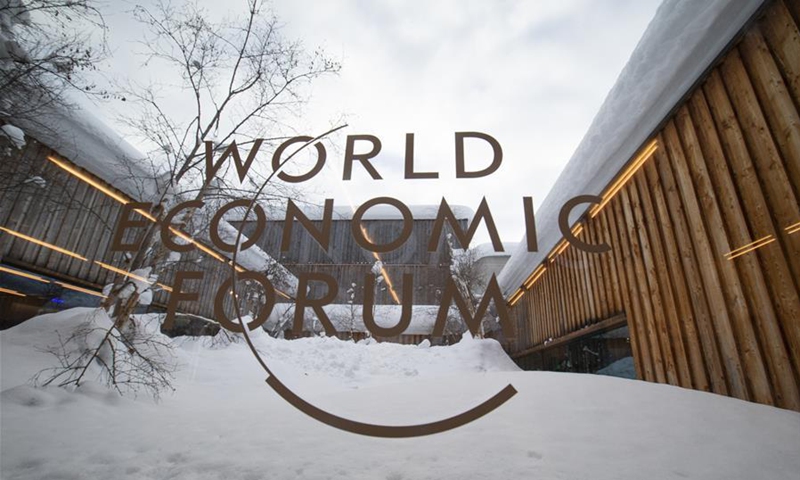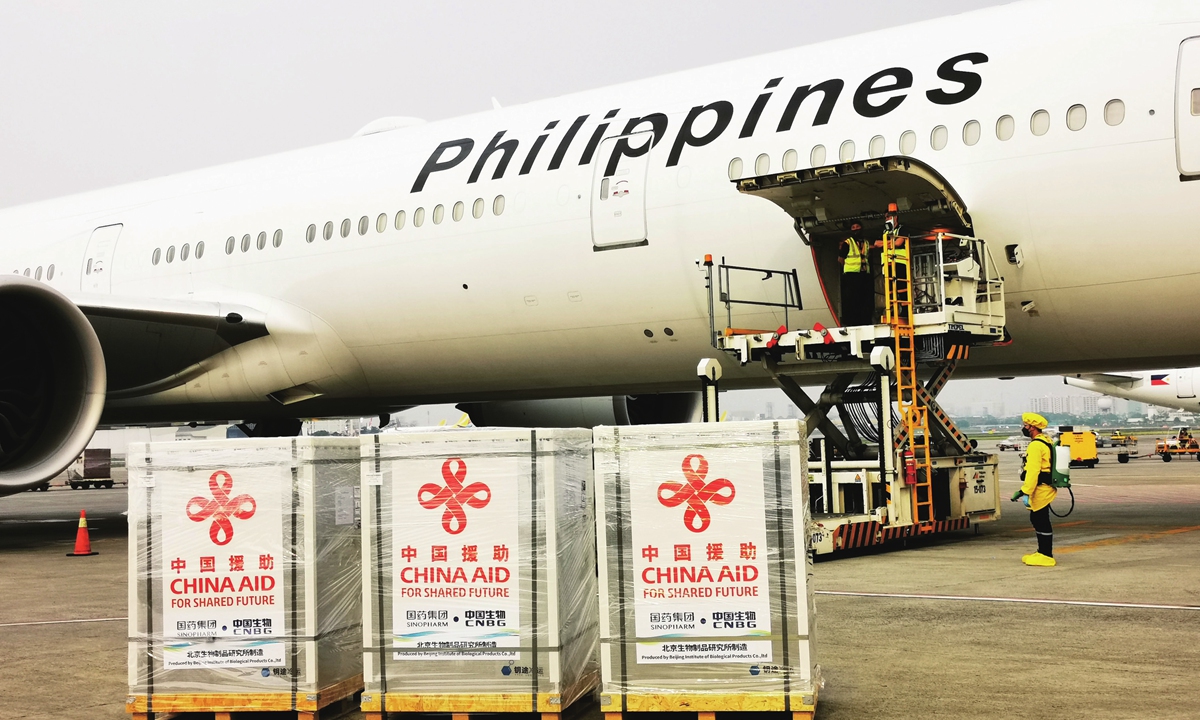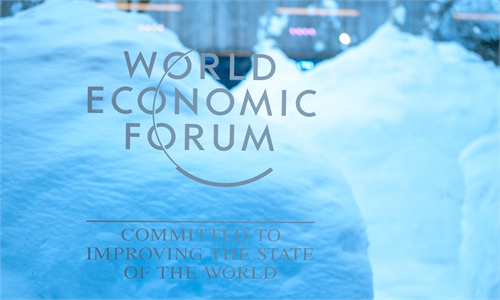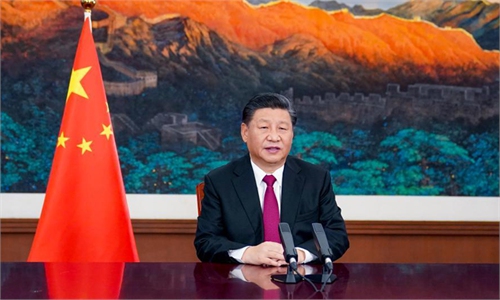Xi to address Davos, offer Chinese solution to pandemic-fraught, protectionist-ridden world economy

Photo taken on Jan. 21, 2019 shows the logo of the World Economic Forum (WEF) in Davos, Switzerland. The WEF Annual Meeting will kick off in Davos. Photo:Xinhua
Chinese President Xi Jinping will attend the 2022 Davos World Economic Forum Virtual Session and deliver remarks from Beijing via video link on Monday. Observers said that as the world is once again at the crossroads dealing with COVID-19, China, with its contributions to global prevention of the COVID-19 and stable economic development, could offer Chinese approaches and wisdom in not only recovery but also resisting erosion of protectionism and unilateralism.
At the invitation of Klaus Schwab, founder and executive chairman of the World Economic Forum, Xi will attend the event on Monday, Foreign Ministry spokesperson Hua Chunying announced Friday.
The Davos Agenda virtual event will take place from January 17 to 21, featuring heads of state and government, CEOs and other leaders to discuss critical challenges. The event marks the launch of several forum initiatives including efforts to accelerate the race to net-zero emissions, ensure the economic opportunity of nature-positive solutions, create cyber resilience, strengthen global value chains, build economies in fragile markets through humanitarian investing, bridge the vaccine manufacturing gap and use data solutions to prepare for the next pandemic, according to a release from the official website.
Against the rampant spread of the Omicron variant globally, the world is once again standing at the crossroads. And while world leaders gather to discuss global challenges, they eagerly want to hear from China on how the world can work together to fight the COVID-19 pandemic, how to boost the global economy and narrow the development gap, and the development of China's economy, Su Xiaohui, deputy director of the Department for International and Strategic Studies of China Institute of International Studies, told the Global Times.
Su noted that previously, Chinese leader's remarks at Davos forums always helped dispel clouds and offer Chinese approaches and wisdom. In 2017, President Xi's speech, which stressed China's openness to the world, bolstered global confidence in globalization and the future.
In 2021, while the world was still fighting the coronavirus and threatened by protectionism, President Xi also delivered stern repudiation in many important multilateral issues of bullying tactics, ideological prejudice and hatred as well as economic decoupling and sanctions, which he warned could push the world into division and confrontation, and offered an inclusive multilateral approach that would guide the world out of darkness.
China has stood out not only in fighting the COVID-19 domestically but also in resuming economic development amid gloomy expectations, making it the engine for global recovery and stabilizer of the global industrial chain in the post-COVID-19 era. It could offer the world China's approach and wisdom to resist the erosion of protectionism, observers said.
Other leaders who will attend the event include Indian Prime Minister Narendra Modi, Japanese Prime Minister Kishida Fumio, Australian Prime Minister Scott Morrison, UN Secretary-General Antonio Guterres, President of EU Ursula von der Leyen and US Treasury Secretary Janet Yellen.
Chinese approaches
"Pandemic recovery," "economic and social resilience" and global cooperation are key topics for the Davos event. Now in the third year of the pandemic, the rapid development of vaccines is a scientific achievement for the ages but the Omicron variant shows the world must prioritize universal global distribution. And the pandemic also set the world back with many problems including vaccine inequality, according to a release from the forum's official website.
As a country that has the largest population in the world, China adopts its own method to put the epidemic under control and it is also exploring ways to update its dynamic zero policy and balance prevention and economic development, which could offer experience to other countries and contribute to the global fight against the coronavirus, Huo Jianguo, vice chairman of the China Society for World Trade Organization Studies in Beijing, told the Global Times on Friday.
As a developing country, as long as China has put the COVID-19 under control, it wasted no time to assist other countries, including donating vaccines especially to the vast developing countries to narrow the vaccination gap globally, Huo noted.
As of the end of 2021, only 7.5 percent of the African continent's 1.3 billion people are fully vaccinated, while a few Western countries are stockpiling far more vaccines than they need and are wasting them. Some Western countries donated vaccines that are sure to expire to developing countries, especially to the African continent, which drained the expectations and budgets of the receiving countries.

A new batch of COVID-19 vaccines aided by the Chinese government arrives in Manila on August 20. Photo: cnsphoto
China had already provided about 180 million doses of vaccine to Africa as of November 30, 2021, covering almost all African countries. Most of the more than 6 million doses of COVID-19 vaccines administered in Zimbabwe were developed by Chinese companies.
In August 2021, President Xi vowed to make efforts to provide the world with 2 billion doses of COVID-19 vaccine this year and donate $100 million to COVAX to promote global vaccine provisions, in a written address to the first meeting of a forum on international cooperation on COVID-19 vaccines.
Since the outbreak of the epidemic, China has also become the only major economy in the world to achieve positive growth in 2020 under strong epidemic control policies, and has become the backbone of global economic growth, experts said, noting that China's economic achievements could also inject confidence in global leaders on recovery.
The International Finance Forum in December estimated that the global economy is forecast to grow 5.9 percent in 2022, recovering to a pre-pandemic 2019 level. China will remain the largest contributor to global growth at 26.3 percent, followed by the US at 16.7 percent and India at 11 percent.
The IMF forecast a 5.6-percent GDP growth for China in 2022, higher than the average growth of 4.9 percent.
"China's practice has proven that China not only controlled the epidemic, but also ensured sustainable economic development with positive growth," Huo said, noting that "the stability of China's economy is its contribution to the global economy, for the size of China's economy is relatively large."
If the world economy grows by an average of 5 percent this year, China will not contribute less than one-third of the global economy, he predicted.
Some downplayed China's development in the last 10-20 years. But looking back, most of the pessimism shows that they were not willing to see any good in China, and they hoped to see China encounter greater difficulties, Lian Ping, head of the Zhixin Investment Research Institute, told the Global Times.
To beef up its economy, an open China is providing important historical opportunities for companies from all over the world to share the dividends of China's development.
Starting January 2022, China canceled restrictions on foreign shareholding ratios in passenger car manufacturing. Following the opening-up of financial service industries such as securities and insurance, China's manufacturing industry has accelerated and further opened up.
According to a survey released by the American Chamber of Commerce in Shanghai in September, 59.5 percent of the US companies surveyed said they increased their investment in China in 2021, a year-on-year increase of 30.9 percent, close to the level before the start of the trade dispute between the two countries in 2018.
American companies and investments are continuing to flock into the Chinese market, which shows the trend of economic globalization is irreversible, and the US government's "decoupling" policy is self-defeating, market watchers said.
China is playing a bigger role in global supply chains. China's railway operator reported a new record of 15,000 China-Europe freight train trips were made in 2021, up 22 percent from 2020, showing that China-Europe freight trains have become a powerful "anchor of stability" in the global supply chain, which is critical to the smooth operation of supply chains across Central Europe and Central Asia.
China-Europe freight trains have set new records while providing stable, reliable and high-efficiency logistical service as a pillar for global supply chains, Chinese Foreign Ministry spokesperson Wang Wenbin said earlier this month.
China is also deepening its economic integration with the Asia-Pacific and other regions in the world, and has pushed international economic cooperation to new heights.
The world witnessed the establishment of its largest trade bloc, the Regional Comprehensive Economic Partnership (RCEP), from the beginning of 2022, marking a glorious victory of multilateralism and boosting trade prospects for countries in the Asia-Pacific region.
While advancing domestic oversight, China has been active in seeking cooperation with the international community. China has officially filed an application to join the Comprehensive and Progressive Agreement for Trans-Pacific Partnership (CPTPP), and also applied to join the Digital Economy Partnership Agreement.
The trend of anti-globalization in developed countries is rampant, but China is becoming an important driving force for market opening and economic globalization, Cheng Dawei, a research fellow at the Institute of China's Economic Reform and Development under Renmin University of China, told the Global Times.
The world needs to resist trade protectionism and peel off the Cold War and anti-globalization thinking, in order to create better conditions for recovery, Huo said.
"If the world can't do it together, the recovery will not be effective in the short term," Huo warned.


